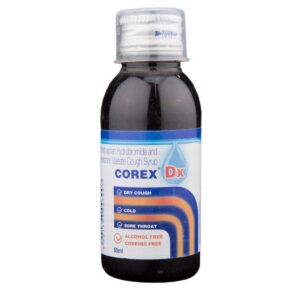CHLORPHENIRAMINE MALEATE + DEXTROMETHORPHAN + MENTHOL
Chlorpheniramine Maleate: Chlorpheniramine Maleate is an antihistamine drug that is commonly used to treat symptoms related to allergies, such as sneezing, itching, watery eyes, and runny nose. It can also be used to relieve symptoms associated with the common cold or hay fever.
The drug works by blocking the action of histamine, a chemical in the body that is released during an allergic reaction. By doing so, it helps to reduce the symptoms caused by histamine, providing relief to the individual.
Chlorpheniramine Maleate is available in various forms, including tablets, capsules, and syrups. The dose and frequency of administration may vary depending on the individual’s age, weight, and the severity of symptoms. It is typically taken orally, with or without food.
Common side effects of Chlorpheniramine Maleate may include drowsiness, dizziness, dry mouth, blurred vision, and constipation. These side effects are usually mild and go away on their own. However, if these symptoms persist or worsen, it is recommended to seek medical attention.
This drug may interact with various other medications, including sedatives, tranquilizers, and alcohol. It is important to inform your healthcare provider about all the medications you are taking to avoid any potential drug interactions.
It is worth noting that Chlorpheniramine Maleate may cause drowsiness, and individuals who are operating heavy machinery or driving should exercise caution while taking this medication.
Overall, Chlorpheniramine Maleate is an effective antihistamine used to alleviate allergy symptoms. It is important to follow the prescribed dose and consult a healthcare professional if any concerns or questions arise.
Dextromethorphan: Dextromethorphan is a drug commonly used as a cough suppressant. It is categorized as an antitussive agent and is available both over-the-counter and with a prescription.
The exact mechanism of action of dextromethorphan is not fully understood, but it is believed to work by suppressing the cough reflex in the brain. It does this by binding to and blocking NMDA receptors, as well as inhibiting the reuptake of serotonin. This results in a reduction in the intensity and frequency of coughing.
The typical recommended dose of dextromethorphan can vary depending on the formulation and the age of the patient. For adults and children over 12 years old, the usual dose is 10-30 mg every 6-8 hours, not exceeding 120 mg in a 24-hour period. For children between 6-12 years old, the dose is usually 5-15 mg every 6-8 hours, not exceeding 60 mg in a 24-hour period. Children under 6 years old should only take dextromethorphan under the guidance of a healthcare professional.
While dextromethorphan is generally considered safe when used as directed, it can have some side effects. Common side effects may include drowsiness, dizziness, nausea, vomiting, and stomach upset. In some cases, dextromethorphan abuse, where individuals take excessive doses, can lead to more serious side effects such as confusion, hallucinations, rapid heartbeat, high blood pressure, respiratory depression, and even death.
It is important to note that dextromethorphan can interact with other medications, especially those that affect serotonin levels such as selective serotonin reuptake inhibitors (SSRIs) or monoamine oxidase inhibitors (MAOIs). Therefore, it is crucial to consult a healthcare professional or pharmacist before taking dextromethorphan if you are already taking any other medications to avoid potential drug interactions or complications.
Overall, dextromethorphan is a cough suppressant commonly used to relieve cough symptoms. However, it should be used with caution, following the recommended dose, and under the guidance of a healthcare professional to ensure its safe and effective use.
Menthol: Menthol is a compound that is extracted from peppermint or other mint oils. It is commonly used in various pharmaceutical products, including topical ointments, cough drops, and mouthwashes, due to its cooling and soothing properties.
The primary use of menthol is as a topical analgesic or pain reliever. It has a numbing effect on the skin and mucous membranes, providing temporary relief from minor aches and pains. Menthol also has a local anesthetic effect, which can help alleviate symptoms of itching and irritation.
The exact mechanism of action of menthol is not fully understood. It is believed to work by activating the cold-sensitive receptors in the skin and mucous membranes, which leads to a cooling sensation. This activation can interfere with the transmission of pain signals, providing relief from discomfort.
Menthol is available in various forms, including creams, gels, sprays, and lozenges. The dose and application method may vary depending on the specific formulation and intended use. It is important to carefully read and follow the instructions provided with the product.
When used as directed, menthol is generally considered safe. However, some individuals may experience mild side effects, which can include skin irritation, redness, or a burning sensation at the application site. Allergic reactions to menthol are rare but can occur. It is advisable to discontinue use and seek medical attention if any severe or persistent adverse effects occur.
It’s worth noting that menthol should not be used on broken or irritated skin, and it is not intended for use in children under the age of 2. Pregnant or breastfeeding individuals should also consult their healthcare provider before using menthol products.
In summary, menthol is a commonly used compound with analgesic properties. It provides temporary relief from minor aches and pains and is available in various forms. While generally safe, it can cause mild side effects, and caution should be taken to follow the recommended dosage and application instructions.

